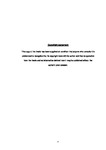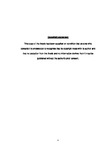An evaluation of the impact of event attendance on perceptions of the host organisation’s reputation: a university case study
| dc.contributor.supervisor | Jackson, Nigel | |
| dc.contributor.author | Angliss, Katie | |
| dc.contributor.other | Faculty of Arts, Humanities and Business | en_US |
| dc.date.accessioned | 2017-08-15T10:36:19Z | |
| dc.date.issued | 2017 | |
| dc.identifier | 10124278 | en_US |
| dc.identifier.uri | http://hdl.handle.net/10026.1/9822 | |
| dc.description.abstract |
Reputation is an important asset for organisations worldwide. Many researchers have attempted to develop a measurement construct to assess an organisation’s reputation, with the RepTrak System being recognised to be the world’s first tool that assess reputation across multiple stakeholders and areas of the organisation. Nevertheless, the characteristics, methods and stakeholders to include within an assessment of this intangible asset continues to be widely debated. Organisations are under intense scrutiny by their stakeholders, with reputation being an organisational asset on which many opinions are formed. Universities in the UK are no different, as they compete for students from around the world, with the institutions thought to have the best reputations, attracting more students. Nevertheless, no agreed measure for assessing a university’s reputation exists, with many organisations relying solely on league table rankings. Thus, this thesis evaluated existing reputation measurement characteristics, to determine their applicability in assessing the reputation of a UK university. The antecedents of reputation are also widely debated. Authors suggest that stakeholders’ prior knowledge and experience, and communication they receive from an organisation contributes to their perceptions of that organisation’s reputation. The Media Richness Theory suggests a hierarchy to this communication, with face-to-face communication recognised to be of increasing importance due to its ‘rich’ nature. Consequently, the use of events as a strategic communication tool for marketing and public relations purposes has become increasingly popular. Nevertheless, the impact of these events on an organisation’s reputation has yet to be assessed. Thus, the aim of x this thesis is to evaluate the impact that these events have on stakeholders’ perceptions of a UK university’s reputation. A case study methodology, using mixed methods, and underpinned by a pragmatic philosophical perspective was adopted. Five semi-structured interviews were held with senior managers during the first phase of data collection and analysis. Results from these interviews were used to determine the strategic purpose of events as a communication tool. In phase two of the research, the study’s main variables (Reputation, Event Influence, Knowledge and Familiarity, Future Intentions) are combined into a model to assess their relationships. These are tested using Structural Equation Modelling, and data collected from 23 university events and 592 event attendees, using a quantitative questonniare. This study contributes to our knowledge and understanding of the benefits of using events as a form of communication, and highlights the necessity of using a variety of communication channels to inform different stakeholder groups. Findings within this research contradict existing knowledge within the UK Higher Education Industry, by suggesting that university league tables were not the most frequently used method of assessing a university’s reputation, and that rather stakeholders base their perceptions on their personal experience with the institution. Consequently, attending events is found to have a positive influence on attendees’ perceptions of the university’s reputation, however a threshold level exists for stakeholders with high levels of familiarity with the university. Therefore, evidence of the impact of using events as a communication tool is found with a positive return on investment in terms of reputation gains. Thus, findings can be used to inform communication strategy within the higher education industry within the UK. | en_US |
| dc.language.iso | en | |
| dc.publisher | University of Plymouth | |
| dc.subject | Reputation | en_US |
| dc.subject | Events | en_US |
| dc.subject | Communication | en_US |
| dc.subject | Structural Equation Modelling | en_US |
| dc.subject | University reputation | en_US |
| dc.subject | Communication theory | en_US |
| dc.subject | Media Richness Theory | en_US |
| dc.subject | Public Relations | en_US |
| dc.subject | Public Relations Events | en_US |
| dc.subject | Event evaluation | en_US |
| dc.subject | event service quality | en_US |
| dc.subject.classification | PhD | en_US |
| dc.title | An evaluation of the impact of event attendance on perceptions of the host organisation’s reputation: a university case study | en_US |
| dc.type | Thesis | |
| plymouth.version | publishable | en_US |
| dc.identifier.doi | http://dx.doi.org/10.24382/539 | |
| dc.rights.embargodate | 2018-08-15T10:36:19Z | |
| dc.rights.embargoperiod | 12 months | en_US |
| dc.type.qualification | Doctorate | en_US |
| rioxxterms.version | NA | |
| plymouth.orcid_id | orcid.org/0000-0002-2630-3603 | en_US |
Files in this item
This item appears in the following Collection(s)
-
01 Research Theses Main Collection
Research Theses Main



